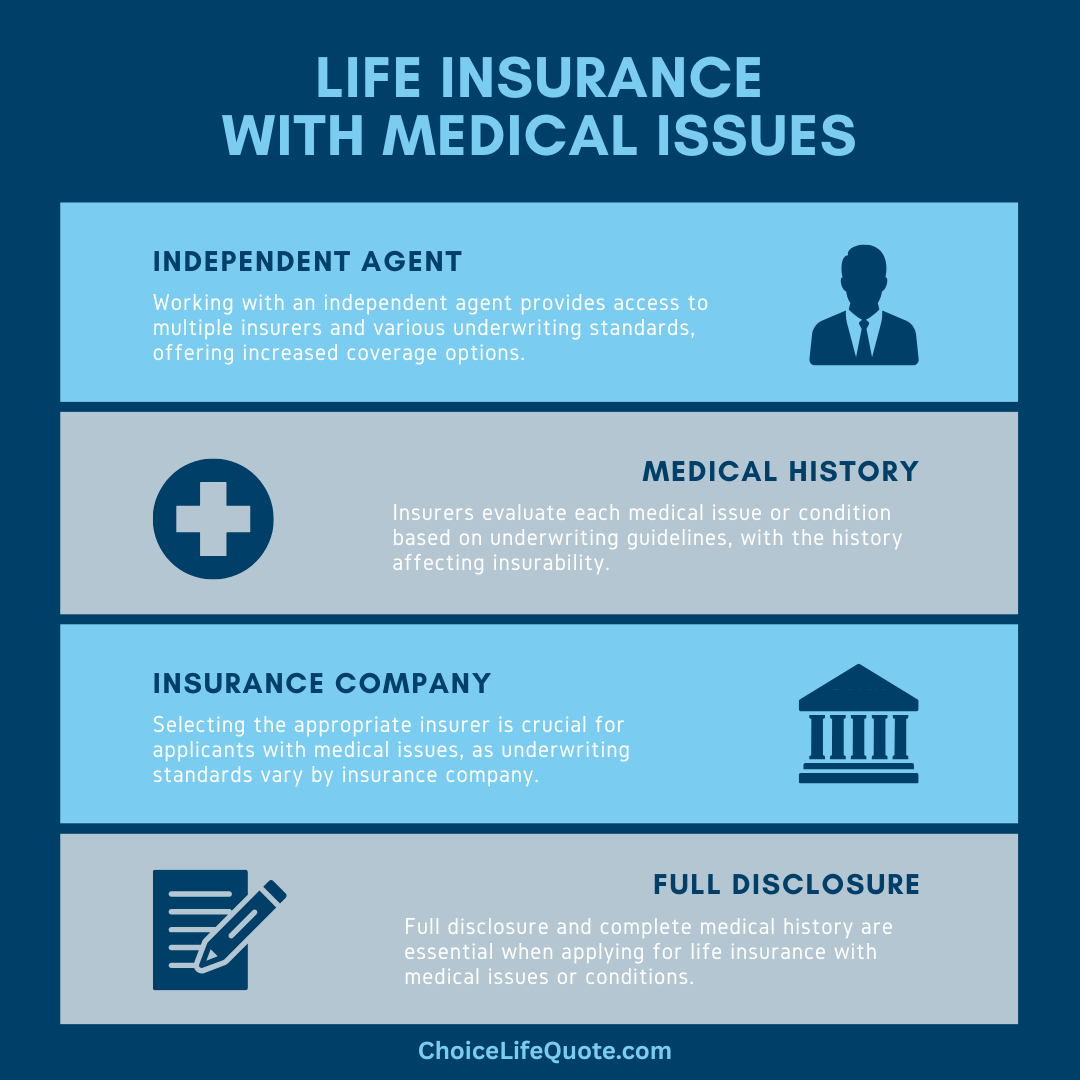Qualifying for Life Insurance with Medical Conditions

The process of applying for life insurance can be confusing enough without the complication of serious medical conditions. In evaluating an application, insurance companies routinely have standardized underwriting processes. Since insurance companies consider your health and medical history in the application process, certain pre-existing conditions may cause your rates to increase or coverage to be declined altogether. However, just because you have a history of medical issues does not mean that you are uninsurable. A few insider tips related to life insurance with medical conditions can significantly improve your chances of getting the coverage you need at the best possible rates.
This article provides insight into qualifying for life insurance with medical conditions, and provides information about how medical conditions affect rates and qualifying for coverage, as well as highlighting health conditions that may affect policy rates and approval.
How Medical Conditions Affect Rates
As a part of the underwriting process life insurance companies routinely evaluate an applicant’s overall health and medical history.
The company’s underwriting decision involves policy approval or denial, and assigning premium rate classifications based on the individual applicant’s determined level of risk to the insurance company.

According to AIG, "health is one of several factors considered when you apply for life insurance. Even though it can play a significant role in premium rates, it's unlikely that you'll be disqualified."
Given this process, a person’s health can have a significant impact on qualifying for life insurance with medical conditions and associated premium rates. Minor conditions controlled through diet or medication may not have an impact on rates, while more serious or uncontrolled conditions may cause rates to increase significantly or coverage to be declined. Given the potential impact of medical conditions on your life insurance policy approval and premium rates, it is important to put your best foot forward when applying for coverage.
Fully Underwritten vs. No Exam Policies
Should applicants with health conditions apply for no exam life insurance, rather than a fully underwritten policy?
If you are fairly healthy and need coverage quickly or have not been to the doctor in a few years, a no exam life insurance policy can be a great option.

However, these plans may automatically decline certain health conditions due to a lack of detailed medical information, lab results, and other elements. If you have a history of medical issues, a fully underwritten policy may be a better choice for obtaining life insurance with medical conditions. Fully underwritten policies allow the insurance company to conduct a comprehensive evaluation of your health and medical conditions, then assign an appropriate underwriting class.
The best policy option, whether fully underwritten or no exam coverage, will ultimately depend on your individual situation and history. If you have been denied coverage based on medical considerations and have been found to be uninsurable, there are additional policy options in the form of guaranteed issue plans. Though more expensive than traditional coverage, these plans provide guaranteed approval and coverage.
Qualifying with Medical Conditions
There are four essential keys to qualifying for life insurance with medical conditions. It is important that you work with an experienced independent agent, understand the impact of your medical condition, choose the right insurance company, and provide complete and accurate information about your medical conditions and health history.
1
Select an Experienced Independent Agent
In the world of finance, not all life insurance agents are created equal. Working with an experienced independent agent gives you a significant advantage in navigating the application process. Insurance companies often have varying standards when considering different medical conditions, and an agent’s understanding of these underwriting “niches” can significantly work to your benefit. An independent agent has access to potentially dozens of insurance companies and can help to match you with the insurer that best fits your situation. This process of “shopping” several companies can ensure that you get the best value and is traditionally only available through an independent agent or broker.
2
Understand the Impact of Medical Condition
It is important to consider that each medical condition is unique, and insurance companies assess them accordingly. While some conditions like well-managed diabetes or hypertension may have a minimal impact on your premiums, others such as cancer or heart disease might lead to higher rates or potentially a denial of coverage. It's crucial to understand how specific medical conditions are perceived by insurers. Factors such as the severity, treatment history, and current health status play pivotal roles in eligibility and the cost of a life insurance policy. By understanding these nuances, you can better prepare for the underwriting process and potentially improve your chances of securing favorable coverage.
3
Choose the Right Life Insurance Company
For life insurance applicants with high-risk medical conditions, choosing the right insurance company can literally make the difference between getting affordable coverage or potentially being declined. As mentioned above, insurance companies often have different underwriting standards when evaluating certain health and medical issues. For example, Protective Life will offer a “preferred best” underwriting class to an applicant being successfully treated for high blood pressure, while Prudential will not. However, Prudential traditionally offers better underwriting classes for smokeless tobacco, sleep apnea, and medical marijuana. It is important to consider potential underwriting “niches,” as well as company financial strength ratings when choosing an insurance company.
4
Provide Complete and Accurate Information
In applying for life insurance with medical conditions, it is extremely important to provide complete and accurate information related to your health conditions and medical history. The requested information may include diagnosis, treatment dates, plan of care, medications, prognosis, and other relevant data. Insurance companies often have a standard underwriting questionnaire for common medical conditions which outline specific information needed. Providing complete and accurate information allows the underwriter to accurately assess your condition and make decisions based on your individual situation. It may also be helpful to submit a cover letter to the insurance company addressing your condition and highlighting any positive health or lifestyle considerations. Your agent can also assist in putting together a cover letter for the insurance company’s underwriting team.

Understanding Key Medical Conditions
Can an individual qualify for life insurance with medical conditions or health issues?
How will certain health and/or medical conditions affect your insurance rates?
Qualifying for life insurance with medical conditions, even moderate to severe issues, is more common than you would think.

The fact is that most life insurance applicants are not necessarily in perfect health. The key, as mentioned above, is to work with an experienced independent agent, choose the right insurance company, and provide complete and accurate health information when applying. Insurance companies understand that each applicant has their own health profile and will evaluate each individual applicant for coverage assigning an appropriate underwriting class or rating. The following provides examples of how common medical conditions are viewed by insurers and can potentially impact approval and premium rates.
Alcohol Abuse
According to the Mayo Clinic, alcohol use disorder (which includes a level that's sometimes called alcoholism) is a pattern of alcohol use that involves problems controlling drinking, being preoccupied with alcohol, or continuing to use alcohol even when it causes problems. This diagnosis can include a wide range of conditions.

It can also involve having to drink more to get the same effect, or having withdrawal symptoms when you rapidly decrease or stop drinking. Applying for life insurance with medical conditions such as alcohol use disorder can impact premium rates and policy approval. Though underwriting standards vary by insurance company, reformed alcoholism may result in a Table B or greater rating increasing rates by 150% or more above standard, while continued alcohol use may result in a decline of coverage.
Learn more: Alcohol Use Disorder
Alzheimer's Disease
According to the Mayo Clinic, Alzheimer's disease is a progressive disease that destroys memory and other important mental functions. This disease is the most common cause of dementia, a group of brain disorders that cause the loss of intellectual, social, and other skills.

In Alzheimer's, the brain cells degenerate and die, causing a steady decline in memory and mental function. Applying for life insurance with medical conditions such as Alzheimer's disease or other related conditions can impact premium rates and approval. Though underwriting standards vary by insurance company, Alzheimer's will typically result in a significant table rating or decline of coverage.
Learn more: Alzheimer's Disease
Anemia
According to the Mayo Clinic, anemia is a condition in which the body does not have enough healthy red blood cells to carry adequate oxygen to the body's tissues. Having anemia may make you tired and weak. There are many forms of anemia, each with its own cause and symptoms.

Anemia can be temporary or long-term, and it can range from mild to severe. Treatments for anemia can also range from taking supplements to undergoing serious medical procedures. Applying for life insurance with medical conditions such as anemia can impact premium rates and policy approval. Though underwriting standards vary by insurance company, recovered anemia may qualify for a preferred underwriting class. Whereas, sickle cell disease and other severe forms of anemia may result in a Table D or greater rating increasing rates by 200% or more above standard or a complete decline of coverage.
Learn more: Anemia
Aneurysm
According to the Mayo Clinic, an aneurysm is an abnormal bulge or ballooning in the wall of a blood vessel.
An aneurysm can burst or rupture without notice, causing internal bleeding and often leading to a serious medical emergency or even death in some instances.

Aneurysms usually do not cause symptoms, so you might not know you have an aneurysm even if it's large. Aneurysms can develop in several parts of your body, including the aorta, brain, and other parts of the body, such as your legs, groin or neck. Applying for life insurance with medical conditions such as an aneurysm can impact premium rates and policy approval. Though underwriting standards vary by insurance company, an unrepaired aneurysm may result in a decline of coverage.
Learn more: Aneurysm
Anorexia Nervosa
According to the Mayo Clinic, anorexia is a common eating disorder characterized by abnormally low body weight, an intense fear of gaining weight, and a distorted perception of weight and weight gain. This condition can have both physical and emotional effects.

People with anorexia place a high value on controlling their weight and shape, using extreme efforts that tend to significantly interfere with their lives. Applying for life insurance with medical conditions such as anorexia can impact premium rates and policy approval. Though underwriting standards vary by insurance company, recovered anorexia stable for at least one year may qualify for a Table B or greater rating increasing rates by 150% or more above standard, while current anorexia issues may result in a decline of coverage.
Learn more: Anorexia Nervosa
Anxiety Disorders
According to the Mayo Clinic, people with anxiety disorders frequently have intense, excessive and persistent worry about everyday situations. Often, anxiety disorders involve repeated episodes of sudden feelings of intense anxiety and fear or terror that reach a peak within minutes (panic attacks).

These feelings of anxiety and panic interfere with daily activities, are difficult to control, and are out of proportion to the actual danger. Applying for life insurance with medical conditions such as anxiety disorder can impact premium rates and policy approval. Though underwriting standards vary by insurance company, mild or well-controlled anxiety disorders may qualify for a preferred underwriting class, while more severe disorders may result in a Table B or greater rating, increasing rates by 150% or more above standard.
Learn more: Anxiety Disorders
Arrhythmia
According to the Mayo Clinic, heart rhythm problems (heart arrhythmias) occur when the electrical impulses that coordinate your heartbeats don't work properly, causing your heart to beat too fast, too slow or irregularly. Arrhythmias may be harmless, but may also cause various medical issues.

Some arrhythmias may cause bothersome, sometimes even life-threatening, signs and symptoms. Applying for life insurance with medical conditions such as an arrhythmia can impact premium rates and policy approval. Though underwriting standards vary by insurance company, a few premature ventricular contractions (PVCs) may qualify for a standard underwriting class, while many PVCs or other arrhythmias such as atrial fibrillation may result in a Table B or greater rating increasing rates by 150% or more above standard.
Learn more: Arrhythmia
Asthma
According to the Mayo Clinic, asthma is a condition in which your airways narrow and swell and produce extra mucus. This can make breathing difficult and trigger coughing, significant wheezing, and shortness of breath. For some people, asthma is a minor nuisance.

For others, it can be a major problem that interferes with daily activities and may lead to a life threatening asthma attack. Applying for life insurance with medical conditions such as asthma can impact premium rates and policy approval. Though underwriting standards vary by insurance company, mild asthma requiring no medications may qualify for a preferred underwriting class, while more severe cases of asthma may result in a standard or greater rating.
Learn more: Asthma
Build (Obesity)
According to the Mayo Clinic, obesity is a complex disorder involving an excessive amount of body fat.
Obesity isn't just a cosmetic concern. It increases your risk of diseases and health problems, such as heart disease, diabetes, and high blood pressure.

Being extremely obese means you are especially likely to have health problems related to your weight. Applying for life insurance with medical conditions such as obesity can impact premium rates and policy approval. Though underwriting standards vary by insurance company, underwriting classes based on height and weight can range from preferred plus (best class), to table ratings increasing rates significantly or a decline of coverage altogether. The following chart provides an example of height and weight ratios and associated underwriting classes.


Learn more: Life Insurance for Overweight Individuals
Bulimia Nervosa
According to the Mayo Clinic, bulimia is a serious, potentially life-threatening eating disorder. People with bulimia may secretly binge, eating large amounts of food with a loss of control over the eating and then purge, trying to get rid of the extra calories in an unhealthy way.

To get rid of calories and prevent weight gain, people with bulimia may use different methods such as self-induced vomiting, misuse of laxatives, weight-loss supplements, or diuretics. Applying for life insurance with medical conditions such as bulimia can impact premium rates and policy approval. Though underwriting standards vary by insurance company, uncontrolled bulimia may result in a decline of coverage.
Learn more: Bulimia
Cancer
According to the Mayo Clinic, cancer refers to any one of a large number of diseases characterized by the development of abnormal cells that divide uncontrollably and have the ability to infiltrate and destroy normal body tissue. It can be an impactful diagnosis for both patients and families.

Cancer is a leading cause of death in the United States. But survival rates are improving for many types of cancer, thanks to improvements in cancer screening and cancer treatment. Applying for life insurance with medical conditions such as cancer can impact premium rates and policy approval. Though underwriting standards vary by insurance company, cancer may result in underwriting classes ranging from preferred to a complete decline of coverage based on cancer type, treatment, prognosis, time in remission, and other factors.
As examples, fully recovered basal cell carcinoma may qualify for a preferred class, while fully recovered breast cancer, colon cancer, melanoma, or prostate cancer greater than 10 years ago may qualify for a standard underwriting class. Recent cancer diagnosis, ongoing treatment, or other complications may result in a decline of coverage.
Learn more: Life Insurance for Cancer Patients and Survivors
Cardiomegaly
According to the Mayo Clinic, an enlarged heart (cardiomegaly) isn't a disease but rather a sign of another condition. You may develop an enlarged heart due to stress or a medical condition, such as a weak heart muscle, coronary artery disease, heart valve problems, or abnormal heart rhythms.

This condition may be treatable by correcting the cause. Applying for life insurance with medical conditions associated with an enlarged heart can impact premium rates and policy approval. Though underwriting standards vary by insurance company, an enlarged heart may result in a standard or greater underwriting class, to include a decline of coverage based on the underlying condition.
Learn more: Enlarged Heart (Cardiomegaly)
Carotid Artery Disease
According to the Mayo Clinic, carotid artery disease occurs when fatty deposits (plaques) clog the blood vessels that deliver blood to your brain and head (carotid arteries). The blockage increases risk of stroke, a medical emergency occurring when blood supply to the brain is interrupted or seriously reduced.

Stroke is a leading cause of death and permanent disability in the United States. Applying for life insurance with medical conditions such as carotid artery disease or a history of a stroke can impact premium rates and policy approval. Though underwriting standards vary by insurance company, a single stroke, fully recovered with no paralysis, may qualify for a Table B or greater rating increasing rates by 150% or more above standard, while multiple strokes, paralysis, or other complications may result in a decline of coverage.
Learn more: Carotid Artery Disease
Congenital Heart Disease
According to the Mayo Clinic, congenital heart disease (congenital heart defect) is the result of one or more abnormalities in an individual's heart structure that some patients are born with. This most common of birth defects can alter the way blood flows through your heart.

Defects range from simple, which might cause no problems, to complex, which can cause life-threatening complications. Applying for life insurance with medical conditions such as congenital heart disease can impact premium rates and policy approval. Though underwriting standards vary by insurance company, minor heart defects may qualify a standard or greater rating, while more severe cardiac issues may result in a decline of coverage.
Learn more: Congenital Heart Disease
COPD
According to the Mayo Clinic, chronic obstructive pulmonary disease (COPD) is a chronic inflammatory lung disease that causes obstructed airflow from the lungs in patients. Symptoms include breathing difficulty, cough, mucus (sputum) production, and wheezing.

It's caused by long-term exposure to irritating gases or particulate matter, most often from cigarette smoke. Applying for life insurance with medical conditions such as COPD can impact life insurance premium rates and policy approval. Though underwriting standards vary by insurance company, mild COPD may qualify for a Table B or greater rating increasing rates by 150% or more above standard, moderate COPD may qualify for a Table D or greater rating increasing rates by 200% or more above standard, and severe COPD may result in a decline of coverage.
Learn more: COPD
Coronary Artery Disease
According to the Mayo Clinic, coronary artery disease develops when the major blood vessels, also called coronary arteries, that supply a patient's heart with blood, oxygen, and other nutrients become damaged or significantly diseased for various reasons over time.

Eventually, the decreased blood flow may cause chest pain (angina), shortness of breath, or other coronary artery disease signs and symptoms. A complete blockage can cause a heart attack. Applying for life insurance with medical conditions such as coronary artery disease can impact premium rates and policy approval. Though underwriting standards vary by insurance company, mild coronary artery disease and/or a single stent may qualify for a Table B or greater rating increasing rates by 150% or more, while more serious coronary artery disease and multiple stents may qualify for a Table D or greater rating increasing rates by 200% or more above standard, and severe disease, a heart attack under age 40, or other complication may result in a decline of coverage.
Learn more: Coronary Artery Disease
Crohn's Disease
According to the Mayo Clinic, Crohn's disease is an inflammatory bowel disease (IBD) that develops in some patients. It causes inflammation of the digestive tract, which can lead to significant abdominal pain, severe diarrhea, frequent fatigue, weight loss, and often malnutrition.

Crohn's disease can be both painful and debilitating and sometimes may lead to life-threatening complications. Applying for life insurance with medical conditions such as Crohn's disease can impact premium rates and policy approval. Though underwriting standards vary by insurance company, mild to moderate Crohn's disease may qualify for a Table B or greater rating increasing rates by 150% or more above standard, while more serious Crohn's disease and/or complications may result in a decline of coverage.
Learn more: Crohn's Disease
Depression
According to the Mayo Clinic, depression is a mood disorder that causes a persistent feeling of sadness and loss of interest. Also called major depressive disorder or clinical depression, it affects how you feel, think and behave and can lead to a variety of emotional and physical problems.

Those diagnosed with this disorder may have trouble doing normal day-to-day activities and sometimes feel as if life isn't worth living. Applying for life insurance with medical conditions such as depression can impact premium rates and policy approval. Though underwriting standards vary by insurance company, mild depression and/or controlled with one medication may qualify for a preferred underwriting class, multiple medications and/or psychiatric involvement may qualify standard, while severe bipolar disorder may result in a decline of coverage.
Learn more: Depression
Diabetes Mellitus
According to the Mayo Clinic, diabetes mellitus refers to a group of diseases that affect how an individual's body uses blood sugar (glucose). The underlying cause of diabetes varies by type but essentially can lead to excess sugar in your blood and other medical complications.

Chronic diabetes conditions include Type 1 diabetes and Type 2 diabetes, while gestational diabetes occurs during pregnancy and may resolve after delivery. Applying for life insurance with medical conditions such as diabetes can impact premium rates and policy approval. Though underwriting standards vary by insurance company, Type 1 diabetes may qualify for underwriting classes ranging from Table D or greater rating increasing rates by 200% or more above standard, through a complete decline of coverage based on age of diagnosis, insulin use, tobacco history, and other considerations.
While, Type 2 diabetes may qualify for underwriting classes ranging from Table B or greater rating increasing rates by 150% or more above standard, through a complete decline of coverage based on age of diagnosis, level of control (A1C), insulin use, tobacco history, and other considerations.
Learn more: Life Insurance for Diabetics
Diverticulosis / Diverticulitis
According to the Mayo Clinic, diverticulosis occurs when small, bulging pouches (diverticula) develop in your digestive tract. When one or more of these pouches become inflamed or infected, the condition is called diverticulitis.

Diverticulitis can cause severe abdominal pain, fever, nausea, and a marked change in your bowel habits. Mild diverticulitis can be treated with rest, changes in your diet, and antibiotics. Severe or recurring diverticulitis may require surgery.
Applying for life insurance with medical conditions such as diverticulosis or diverticulitis can impact premium rates and policy approval. Though underwriting standards vary by insurance company, diverticulosis may qualify for a preferred underwriting class, mild to moderate diverticulitis (infection) may qualify for a standard or greater underwriting class, while severe recurring diverticulitis and/or associated complications may result in a decline of coverage.
Learn more: Diverticulosis / Diverticulitis
Drug Addiction
According to the Mayo Clinic, drug addiction, also called substance use disorder, is a disease that affects a person's brain and behavior and leads to an inability to control the use of a legally prescribed or illegal drug or medication. This condition affects more individuals that you would suspect.

Drug addiction can start with the experimental use of a recreational drug in social situations, and, for some people, the drug use becomes more frequent. Applying for life insurance with medical conditions such as drug addiction can impact premium rates and policy approval. Though underwriting standards vary by insurance company, drug addition recovered over three years may qualify for a Table D or greater rating increasing rates by 200% or more above standard, while current or more recent drug addiction may result in a decline of coverage.
Learn more: Drug Addiction
EKG Abnormalities
According to the Mayo Clinic, an electrocardiogram (EKG) records the electrical signals in your heart.
This is a common test used to detect heart problems and monitor the heart's status in many situations.

Each beat of your heart is triggered by an electrical impulse normally generated from special cells in the upper right chamber of your heart (pacemaker cells). An electrocardiogram records the timing and strength of these signals as they travel through your heart. Applying for life insurance with medical conditions associated with an abnormal EKG can impact premium rates and policy approval. Though underwriting standards vary by insurance company, abnormal EKG findings may result in a standard or greater underwriting class, including a decline of coverage based on the underlying condition.
Learn more: EKG Abnormalities
Epilepsy / Seizures
According to the Mayo Clinic, epilepsy is a central nervous system (neurological) disorder in which brain activity becomes abnormal, causing seizures or periods of unusual behavior, sensations, and sometimes loss of awareness. Seizure symptoms can vary widely.

Some people with epilepsy simply stare blankly for a few seconds during a seizure, while others repeatedly twitch their arms or legs. Applying for life insurance with medical conditions such as epilepsy can impact premium rates and policy approval. Though underwriting standards vary by insurance company, Petit Mal seizures with minimal residual effects may qualify for a Preferred underwriting class, Grand Mal seizures greater than six months and employed may qualify for a Table B or greater rating, increasing rates by 150% or more above standard, or chronic Grand Mal seizures involving disability may result in a decline of coverage.
Learn more: Epilepsy / Seizures
Fatty Liver
According to the Mayo Clinic, nonalcoholic fatty liver disease is an umbrella term for a range of liver conditions affecting people who drink little to no alcohol. Steatohepatitis, a serious form of the disease, is marked by liver inflammation, which may progress to scarring and irreversible damage.

At its most severe, nonalcoholic steatohepatitis can progress to cirrhosis and liver failure. Applying for life insurance with medical conditions such as fatty liver can impact premium rates and policy approval. Though underwriting standards vary by insurance company, fatty liver may qualify for a standard or greater underwriting class.
Learn more: Fatty Liver
Fibrocystic Breasts
According to the Mayo Clinic, fibrocystic breasts are composed of tissue that feels lumpy or rope-like in texture. Doctors call this nodular or glandular breast tissue. Although many women with fibrocystic breasts don't have symptoms, some women experience breast pain, tenderness, and lumpiness.

Breast symptoms tend to be most bothersome just before menstruation. Simple self-care measures can usually relieve discomfort associated with fibrocystic breasts. Applying for life insurance with medical conditions such as fibrocystic breasts can impact premium rates and policy approval. Though underwriting standards vary by insurance company, fibrocystic breasts may qualify for a preferred or greater underwriting class.
Learn more: Fibrocystic Breasts
Gastroesophageal Reflux
According to the Mayo Clinic, gastroesophageal reflux disease (GERD) occurs when stomach acid frequently flows back into the esophagus. This backwash (acid reflux) can irritate the lining of the esophagus and cause additional issues.

Most people can manage the discomfort of GERD with lifestyle changes and over-the-counter medications. But some people with GERD may need stronger medications or surgery to ease symptoms. Applying for life insurance with medical conditions such as GERD can impact rates and policy approval. Though underwriting standards vary by insurance company, GERD with or without treatment may qualify for a preferred or greater underwriting class.
Learn more: Gastroesophageal Reflux Disease
Gilbert's Syndrome
Gilbert's syndrome is a common, yet harmless liver condition in which the liver doesn't properly process bilirubin.
Bilirubin is produced by the breakdown of red blood cells in the body.

You might not know you have the condition until it's discovered by accident, such as when a blood test shows elevated bilirubin levels. Gilbert's syndrome requires no treatment. Applying for life insurance with medical conditions such as Gilbert's Syndrome can impact rates and policy approval. Though underwriting standards vary by insurance company, Gilbert's Syndrome may qualify for a Preferred or greater underwriting class.
Learn more: Gilbert's Syndrome
Glomerulonephritis
According to the Mayo Clinic, glomerulonephritis, or Bright's Disease, is inflammation of the tiny filters in your kidneys (glomeruli). Glomerulonephritis can come on suddenly (acute) or gradually (chronic), and may occur on its own or as part of another disease process, such as lupus or diabetes.

Severe or prolonged inflammation associated with glomerulonephritis can damage your kidneys. Applying for life insurance with medical conditions such as glomerulonephritis can impact premium rates and policy approval. Though underwriting standards vary by insurance company, acute recovered glomerulonephritis may qualify for a standard or greater underwriting class, chronic glomerulonephritis with good renal function may qualify for a Table B or greater rating increasing rates by up to 150% or more above standard or chronic glomerulonephritis with poor renal function may result in a decline of coverage.
Learn more: Glomerulonephritis
Heart Murmur
According to the Mayo Clinic, heart murmurs are sounds during your heartbeat cycle made by turbulent blood in or near your heart. Heart murmurs can be present at birth (congenital) or develop later in life. A heart murmur isn't a disease, but murmurs may indicate an underlying heart problem.

They are often harmless, not requiring treatment. However, some heart murmurs may require follow-up tests to rule out a serious underlying heart condition. Treatment, if needed, is directed at the cause of your heart murmur. Applying for life insurance with medical conditions associated with a heart murmur can impact premium rates and policy approval. Though underwriting standards vary by insurance company, heart murmurs may result in a standard or greater underwriting class, to include a decline of coverage based on the underlying condition.
Learn more: Heart Murmur
Hemochromatosis
According to the Mayo Clinic, hemochromatosis causes your body to absorb too much iron from the food you consume.
Excess iron is stored in your organs, especially your liver, heart, and pancreas.

Too much iron can lead to life-threatening conditions, such as liver disease, heart problems, and diabetes. Treatment can include removing blood from the body. Because much of the body's iron is contained in red blood cells, this treatment lowers iron levels. Applying for life insurance with medical conditions such as hemochromatosis can impact premium rates and policy approval. Though underwriting standards vary by insurance company, hemochromatosis may qualify for a Table D or greater rating, increasing rates by 150% or more above standard, while severe complications or associated conditions may result in a decline of coverage.
Learn more: Hemochromatosis
Hepatitis
According to the Mayo Clinic, hepatitis is a liver condition classified as type A, B, or C based on the underlying virus.
Hepatitis A is a contagious liver infection caused by the hepatitis A virus, causing inflammation and affecting liver function.

Hepatitis B is a serious liver infection caused by the hepatitis B virus (HBV), increasing the risk of liver failure, liver cancer, or cirrhosis. Hepatitis C is a viral infection caused by the hepatitis C virus, resulting in liver inflammation and can lead to serious liver damage. Applying for life insurance with medical conditions such as hepatitis can impact premium rates and policy approval. Though underwriting standards vary by insurance company, fully recovered Hepatitis A may qualify for a preferred or greater underwriting class, hepatitis B or C longer than 2 years with normal liver function may qualify for a Table D or greater rating increasing rates by 200% or more above standard, while hepatitis with abnormal liver function or current symptoms may result in a decline of coverage.
Learn more: Hepatitis
Hypertension
According to the Mayo Clinic, hypertension is a common condition in which the force of the blood against your artery walls is high enough to potentially cause health problems, such as heart disease. You can have high blood pressure for years without symptoms.

Even without symptoms, damage to blood vessels and your heart continues. High blood pressure increases your risk of health problems such as a heart attack or stroke. Applying for life insurance with medical conditions such as hypertension can impact premium rates and policy approval. Though underwriting standards vary by insurance company, well-controlled high blood pressure may qualify for a preferred or greater underwriting class, moderately controlled high blood pressure may qualify for a standard or greater underwriting class, and poorly controlled high blood pressure may qualify for a Table B or greater underwriting class increasing rates 150% or more above standard.
Learn more: Life Insurance with High Blood Pressure
Kidney Disease
According to the Mayo Clinic, chronic kidney disease, also called chronic kidney failure, describes the gradual loss of kidney function.
In the early stages of chronic kidney disease, you may have few signs or symptoms, which can make it difficult to diagnose.

Chronic kidney disease may not become apparent until your kidney function is significantly impaired. Applying for life insurance with medical conditions such as kidney disease can impact premium rates and policy approval. Though underwriting standards vary by insurance company, chronic kidney disease may result in a significant Table rating or a decline of coverage.
Learn more: Kidney Disease
Lupus
According to the Mayo Clinic, lupus is a systemic autoimmune disease that occurs when your body's immune system attacks your own organs. Inflammation caused by lupus can affect different body systems, including your joints, skin, kidneys, blood cells, brain, heart, and lungs.

It can be difficult to diagnose because the signs and symptoms often mimic those of other ailments. While there's no cure for lupus, treatments can help control symptoms. Applying for life insurance with medical conditions such as lupus can impact premium rates and policy approval. Though underwriting standards vary by insurance company, lupus discoid (skin) without complications may qualify for a preferred or greater underwriting class, lupus erythematosus (internal) with no complications for two years may qualify for a Table D or greater rating increasing rates by 200% or more above standard, while lupus erythematosus with complications or lupus nephritis (kidney) may result in a decline of coverage.
Learn more: Lupus
Mitral Valve Prolapse
According to the Mayo Clinic, mitral valve prolapse (MVP) occurs when the leaflets of the mitral valve bulge (prolapse) into the heart's left upper chamber (left atrium) like a parachute during the heart's contraction. In most people, mitral valve prolapse isn't life-threatening and doesn't require treatment or changes in lifestyle.

Some people with mitral valve prolapse, however, require treatment. Applying for life insurance with medical conditions such as mitral valve prolapse can impact premium rates and policy approval. Though underwriting standards vary by insurance company, uncomplicated mitral valve prolapse may qualify for a preferred or greater underwriting class, while complicated mitral valve prolapse may qualify for a Table B or greater rating increasing rates by 150% or more above standard.
Learn more: Mitral Valve Prolapse
Multiple Sclerosis
According to the Mayo Clinic, multiple sclerosis is a potentially disabling disease of the brain and spine.
The immune system attacks the protective sheath that covers nerve fibers, causing communication problems between the brain and body.

This disease can cause nerves to deteriorate, becoming permanently damaged. There is no cure for multiple sclerosis. However, treatments can help speed recovery from attacks and manage symptoms. Applying for life insurance with medical conditions such as multiple sclerosis can impact premium rates and policy approval. Though underwriting standards vary by insurance company, multiple sclerosis stable for one year may qualify for a Table B or greater rating increasing rates by 150% or more above standard, while multiple sclerosis involving instability or complications may result in a decline of coverage.
Learn more: Multiple Sclerosis
Muscular Dystrophy
According to the Mayo Clinic, muscular dystrophy is a group of diseases that cause progressive weakness and loss of muscle mass in affected individuals. In muscular dystrophy, abnormal genes (mutations) interfere with the production of proteins needed to form healthy muscle.

There's no cure for muscular dystrophy. But medications and therapy can help manage symptoms and slow the course of the disease. Applying for life insurance with medical conditions such as muscular dystrophy can impact premium rates and policy approval. Though underwriting standards vary by insurance company, localized muscular dystrophy may qualify for a Table B or greater rating increasing rates by 150% or more above standard, while severe muscular dystrophy may result in a decline of coverage.
Learn more: Muscular Dystrophy
Osteoporosis
According to the Mayo Clinic, osteoporosis causes bones to become weak and brittle. In some instances, so brittle that a fall or even mild stresses such as bending over or coughing can cause a bone fracture.

Osteoporosis affects men and women of all races, but white and Asian women are at the highest risk. Medications, a healthy diet, and weight-bearing exercise can help prevent bone loss or strengthen already weak bones. Applying for life insurance with medical conditions such as osteoporosis can impact premium rates and policy approval. Though underwriting standards vary by insurance company, osteoporosis may qualify for a preferred or greater underwriting class.
Learn more: Osteoporosis
Paraplegia / Quadriplegia
According to the Mayo Clinic, a spinal cord injury, damage to any part of the spinal cord or nerves, often causes permanent changes in strength, sensation, and other body functions. The ability to control your limbs after a spinal cord injury depends on the location and severity of the injury.

Paraplegia means that all or part of the trunk, legs, and pelvic organs are affected, while quadriplegia means the arms, hands, trunk, legs, and pelvic organs are affected. Applying for life insurance with medical conditions such as paraplegia or quadriplegia can impact premium rates and policy approval. Though underwriting standards vary by insurance company, paraplegia over age 60 may qualify for a Table B or greater rating increasing rates by 150% or more above standard, paraplegia under age 60 may qualify for a Table D or greater rating, increasing rates by 200% or more above standard, while quadriplegia may result in a decline of coverage.
Learn more: Paraplegia/Quadriplegia
Parkinson's Disease
According to the Mayo Clinic, Parkinson's disease is a progressive disorder of the nervous system that affects movement.
While tremors are the most well-known sign of the disease, it also commonly causes stiffness or slowing of movement.

Parkinson's disease symptoms worsen as your condition progresses over time. Although the disease can't be cured, medications may improve your symptoms. Applying for life insurance with medical conditions such as Parkinson's disease can impact premium rates and policy approval. Though underwriting standards vary by insurance company, non-progressive Parkinson's may qualify for a Table B or greater rating increasing rates by 150% or more above standard, slowly progressive Parkinson's may qualify for a Table D or greater rating increasing rates by 200% or more above standard, while more severe cases may result in a decline of coverage.
Learn more: Parkinson's Disease
Peptic Ulcer
According to the Mayo Clinic, peptic ulcers are open sores that develop on the inside lining of your stomach and the upper portion of your small intestine.
The most common symptom of a peptic ulcer is stomach pain.

The most common causes of peptic ulcers are infection with H. pylori and long-term use of aspirin and other painkillers, such as ibuprofen and naproxen. Applying for life insurance with medical conditions such as peptic ulcers can impact premium rates and policy approval. Though underwriting standards vary by insurance company, stomach ulcers may qualify for a preferred or greater underwriting class, while duodenal ulcers may qualify for a standard or greater underwriting class.
Learn more: Peptic Ulcer
Peripheral Artery Disease
According to the Mayo Clinic, peripheral artery disease is a common circulatory problem in which narrowed arteries reduce blood flow to your limbs.
This causes symptoms, most notably leg pain when walking (claudication).

Peripheral artery disease can often successfully be treated by quitting tobacco, exercising, and eating a healthy diet. Applying for life insurance with medical conditions such as peripheral artery disease can impact premium rates and policy approval. Though underwriting standards vary by insurance company, a non-smoker with peripheral artery disease may qualify for a Table B or greater rating increasing rates by 150% or more above standard, while a smoker with peripheral artery disease may qualify for a Table D or greater rating increasing rates by 200% or more above standard.
Learn more: Peripheral Artery Disease
Polycystic Kidney Disease
According to the Mayo Clinic, polycystic kidney disease is an inherited disorder in which clusters of cysts develop primarily within your kidneys, causing kidneys to enlarge and lose function over time. Having many cysts or large cysts can damage your kidneys.

The disease can cause serious complications, including high blood pressure and kidney failure. Applying for life insurance with medical conditions such as polycystic kidney disease can impact premium rates and policy approval. Though underwriting standards vary by insurance company, polycystic disease with normal renal function may qualify for a Table D or greater rating, increasing rates by 200% or more above standard, while polycystic disease with impaired renal function may result in a decline of coverage.
Learn more: Polycystic Kidney Disease
Rheumatoid Arthritis
According to the Mayo Clinic, rheumatoid arthritis is a chronic inflammatory disorder that can affect more than just your joints.
In some cases, the condition also can damage a wide variety of body systems, including the skin, eyes, lungs, heart, and blood vessels.

An autoimmune disorder, rheumatoid arthritis, occurs when your immune system mistakenly attacks your own body's tissues. Applying for life insurance with medical conditions such as rheumatoid arthritis can impact premium rates and policy approval. Though underwriting standards vary by insurance company, controlled rheumatoid arthritis may qualify for a Table B or greater rating increasing rates by 150% or more, while rheumatoid arthritis involving disability may result in a decline of coverage.
Learn more: Rheumatoid Arthritis
Sleep Apnea
According to the Mayo Clinic, sleep apnea is a potentially serious sleep disorder in which breathing repeatedly stops and starts.
The main types of sleep apnea are obstructive sleep apnea which occurs when throat muscles relax.

Central sleep apnea which occurs when your brain doesn't send proper signals to the muscles that control breathing, and complex sleep apnea syndrome which occurs when someone has both obstructive sleep apnea and central sleep apnea. Applying for life insurance with medical conditions such as sleep apnea can impact premium rates and policy approval. Though underwriting standards vary by insurance company, sleep apnea corrected by surgery may qualify for a preferred or greater underwriting class, while sleep apnea successfully treated with CPAP may qualify for a Table B or greater rating increasing rates by 150% or more above standard.
Learn more: Life Insurance with Sleep Apnea
Stroke
According to the Mayo Clinic, a stroke occurs when the blood supply to part of your brain is interrupted or reduced, depriving brain tissue of oxygen and nutrients.
Within minutes, brain cells begin to die. A stroke is a medical emergency, and prompt treatment is crucial.

Early action can minimize brain damage and potential complications. The good news is that strokes can be treated and prevented. Applying for life insurance with medical conditions such as a stroke can impact premium rates and policy approval. Though underwriting standards vary by insurance company, a single stroke with full recovery and no paralysis may qualify for a Table B or greater rating increasing rates by 150% or more, while multiple strokes and/or paralysis may result in a decline of coverage.
Learn more: Stroke
Suicide Attempt
According to the Mayo Clinic, suicide, or taking your own life, is a tragic reaction to stressful life situations, and all the more tragic because suicide can be prevented. Whether an individual is considering suicide or knows someone who feels suicidal, learning suicide warning signs and how to reach out for help and treatment may save a life.

Applying for life insurance with medical conditions such as a suicide attempt can impact premium rates and policy approval. Though underwriting standards vary by insurance company, a single suicide attempt after one year may qualify for a Table B or greater rating increasing rates by 150% or more above standard, while multiple suicide attempts may result in a decline of coverage.
Learn more: Life Insurance and Suicide
According to the Mayo Clinic, a transient ischemic attack (TIA) is like a stroke, with similar symptoms, but usually lasting only a few minutes and causing no permanent damage. Often called a mini-stroke, a transient ischemic attack may be a warning.

About 1 in 3 people who have a transient ischemic attack will eventually have a stroke, with about half occurring within a year. Applying for life insurance with medical conditions such as a transient ischemic attack can impact premium rates and policy approval. Though underwriting standards vary by insurance company, a transient ischemic attack may qualify for a Table B or greater rating increasing rates by 150% or more above standard.
Learn more: Transient Ischemic Attack
Ulcerative Colitis
According to the Mayo Clinic, ulcerative colitis is an inflammatory bowel disease that causes long-lasting inflammation and ulcers in your digestive tract.
Ulcerative colitis affects the innermost lining of your large intestine (colon) and rectum.

Ulcerative colitis can be debilitating and can sometimes lead to life-threatening complications. While it has no known cure, treatment can greatly reduce signs and symptoms of the disease. Applying for life insurance with medical conditions such as ulcerative colitis can impact premium rates and policy approval. Though underwriting standards vary by insurance company, ulcerative colitis may qualify for a Table B or greater rating increasing rates by 150% or more above standard.
Learn more: Ulcerative Colitis
Conclusion
In conclusion, while navigating the complexities of life insurance with medical conditions may seem daunting, it's important to remember that being proactive and well-informed can significantly improve your chances of securing the coverage. By working with an experienced independent agent, understanding the impact of medical conditions, choosing the right insurance company, and providing accurate health information, you can optimize your chances for obtaining high-quality and affordable life insurance coverage. This insight and the strategies discussed can help you approach the application process with confidence and ensure your loved ones are protected financially in the future.
Our team can assist in choosing the right type of policy, an appropriate amount of coverage, and the best insurance company for your situation. Get the quality coverage you need at affordable rates. Give us a call at (800) 770-8229 or request an instant quote today!
Disclaimer: Information is intended to be educational in nature and should not be considered financial, tax, or legal advice. Please consult a qualified professional for individual assistance.
Dr. James Shiver is the Managing Principal at ChoiceLifeQuote.com, an online life insurance service in the family and small-business markets. He also serves as a university business professor, as well as being an Accredited Financial Counselor® and financial literacy advocate.


